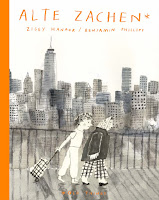One of the things I value about volunteering as a Cybils Awards judge is the element of book discovery. I have publishers, authors, librarians, bloggers, etc. that I trust to suggest excellent titles, and I don’t step outside that circle very often. But the Cybils push me to read more widely within a genre (in this year’s case, in graphic novels). One book that I’m not sure I would have picked up on my own? Nominee Alte Zachen / Old Things by Ziggy Hanaor, illustrated by Benjamin Phillips. And that would have been a tragedy because it’s a heart-full title, and one I’ve been thinking of over and over since I put it down.
A beautifully illustrated and presented intergenerational graphic novel that follows 11-year-old Benji and his elderly grandmother, Bubbe Rosa, as they traverse Brooklyn and Manhattan, gathering the ingredients for a Friday night dinner.
Bubbe’s relationship with the city is complex – nothing is quite as she remembered it and she feels alienated and angry at the world around her. Benji, on the other hand, looks at the world, and his grandmother, with clear-eyed acceptance. As they wander the city, we catch glimpses of Bubbe’s childhood in Germany, her young adulthood in 1950s Brooklyn, and her relationships; first with a baker called Gershon, and later with successful Joe, Benji’s grandfather. Gradually we piece together snippets of Bubbe’s life, gaining an insight to some of the things that have formed her cantankerous personality. The journey culminates on the Lower East Side in a moving reunion between Rosa and Gershon, her first love. As the sun sets, Benji and his Bubbe walk home over the Williamsburg Bridge to make dinner.
This is a powerful, affecting and deceptively simple story of Jewish identity, of generational divides, of the surmountability of difference and of a restless city and its inhabitants.
In Alte Zachen (Yiddish for “old things,” as the title suggests), grandmother Rosa and her young grandson Benji zigzag New York City on a mission: to gather the necessary ingredients for Friday night dinner. Along the way Rosa comments on the changes in the city, and in life and culture over time. Some of these remembrances and flashbacks are sweet, but many are bittersweet, or sad, or resonate with unfulfilled longing. The parallel journeys of a modern-day shopping trip and a long life, combined with watercolor illustrations in a wash of grays and other muted colors, create a deeply impactful narrative.
Some of the most poignant moments in the book occur when Bubbe Rosa is rude, and Benji must deal with this embarrassment in the moment, and buffer between her and others. These moments aren’t indicative of a cruel temperament, but rather open the way for the reader to learn about some of the traumas of Rosa’s life: escaping to Switzerland from Germany ahead of the Holocaust, the loss of old love, changes to cultural norms, and more. At the same time, you feel almost viscerally for Benji, who loves his grandmother but is trying to gracefully manage in the real world. His Bubbe is trying to impart words and traditions (there’s a Yiddish glossary at the back for context if the reader is struggling), and Benji is just trying to get them to the shops and back without incident. It’s sweet, authentic, and entirely human.
Phillips’ art – a muted watercolor palette in the book – contrasts with the bright orange of the book’s spine, title, and end papers (illustrations of lots of everyday food items in black-and-white on an orange background in a repeating pattern). The art feels unfinished and unpolished in a way, even as it washes over memorable architecture in precise detail. There are wordless stretches, where the art is the only context, and Phillips’ art then shines with the attention to expressions, small details, and the elements of culture: dancing, music, and family. Somehow, they all come to life, in real ways.
In all, Alte Zachen / Old Things is a tribute to memory, to culture, and to intergenerational relationships. It’s a lovely meditation on how we pass on ourselves to our loved ones – imperfectly, but with care (and feeding). I loved it, and I think you will too.
Recommended for: fans of contemporary graphic novels featuring intergenerational relationships, Jewish traditions and culture, and city life. Excellent reading and art for the 12+ set, though appropriate for younger ones as well.
















No comments:
Post a Comment